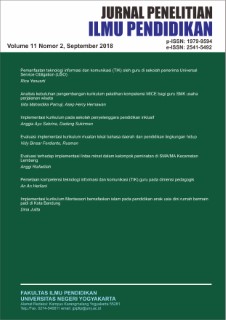Model pembelajaran berbasis balanced literacy approach bermuatan nilai-nilai karakter untuk pembelajaran literasi dasar di kelas awal
DOI:
https://doi.org/10.21831/jpipfip.v11i1.23793Keywords:
learning model, literacy, early gradeAbstract
Artikel ini memaparkan hasil penelitian dan pengembangan model pembelajaran berbasis balanced literacy approach untuk pembelajaran literasi dasar siswa kelas awal sekolah dasar. Penelitian Research and Development (R&D) yang telah diterapkan mengadopsi dari model pengembangan versi Borg and Gall (1989). Penelitian telah dilaksanakan melalui tahap studi pendahuluan dilakukan dengan menerapkan pendekatan deskriptif kualitatif; mengembangkan prototype model pembelajaran, dilanjutkan validasi ahli materi dan pembelajaran; evaluasi yang dilakukan dengan ujicoba implementasi model di kelas I, II, dan III. Teknik pengumpulan data adalah angket, observasi, wawancara. Analisis data dengan deskriptif kuantitatif dan kualitatif. Model pembelajaran yang dikembangkan terdiri atas 4 tahap kegiatan pembelajaran, yaitu tahap I eksplorasi sumber informasi, tahap II penerapan strategi berimbang, tahap III penyajian informasi, dan tahap IV refleksi. Hasil validasi model yang dikembangkan dari ahli materi menunjukkan rerata skor 3,6 (kategori sangat baik) dan rerata skor validasi ahli pembelajaran sebesar 3,6 (kategori sangat baik). Hasil ujicoba implementasi model menunjukkan capaian rerata hasil belajar di kelas I sebesar 91 dari rerata kemampuan awal sebesar 84. Rerata hasil belajar di kelas II sebesar 82 dari rerata kemampuan awal 75, dan di kelas III menunjukkan rerata hasil belajar 74 dari rerata kemampuan awal sebesar 64. Hasil angket respon siswa terhadap implementasi model pembelajaran di kelas I menunjukkan rerata skor 3,3 (kategori sangat baik), kelas II menunjukkan rerata skor 3,7 (kategori sangat baik), dan kelas III menunjukkan rerata skor 3,5 (kategori sangat baik). Secara umum, siswa dalam mengikuti pembelajaran sangat aktif karena dalam pembelajaran ini memberikan berbagai kegiatan literasi yang kreatif dan bervariasi.
Model based learning balanced literacy approach with character values for learning basic literacy in the early grade
This article presents the results of the research and development of model-based learning balanced literacy approach to learning basic literacy students grades early elementary school. Research Research and Development (R&D) had applied to adopt the model of the development version of the Borg and Gall (1989). Research has been carried out through the stage of preliminary studies done by implementing a descriptive qualitative approach; develop a prototype model of learning, validation of learning material and experts; the evaluation is done by trial model implementation in class I, II, and III. The technique of data collection is the question form, observation, interviews. Data analysis with quantitative and qualitative descriptive. The learning model developed consists of 4 stages learning activities, namely phase I exploration of information resources, phase II implementation strategy balanced, presenting information, phase III and phase IV of the reflection. The results of the validation of the model developed from expert material showed a mean score of 3.6 (very good) and the mean score of 3.6 learning expert validation (category very well). The results of the trial implementation of the model shows the average results of close study in class I of 91 of the initial capabilities of average 84. Average results of learning in class II of 82 of average ability early, and 75 in the class III indicates learning outcomes 74 average of average ability early registration 64. The results of the now student response towards the implementation of the model of learning in class I showed a mean score of 3.3 (the category very well), class II indicates the average score of 3.7 (very good), and a class III indicates the average score 3.5 (very good). In General, students follow a very active learning, because in this study provide a variety of literacy activities are creative and varied.
References
Amri, S., dkk. (2011). Implementasi pendidikan karakter dalam pembelajaran. Jakarta: Prestasi Pustaka Raya.
Balitbang. (2010). Pengembangan pendidikan budaya dan karakter bangsa: Pedoman Sekolah. Jakarta: Kementrian Pendidikan Nasional.
Borg, R. W. & Gall, M. (1989). Educational research: an introduction third edition, New York : Longman.
Brown, H. D. (2001). Teaching by principles an interactive approach to language pedagogy (second edition). New York: Longman.
Detik News. (2015). Pelaku kekerasan di SD harus dibina. Berita diunduh tanggal 30 Mei 2016 dari http://news.detik.com/berita/2718216/dirjen-dikdas-pelaku-kekerasan-di-sd-bukittinggi-harus-dibina.
Klein, M.L., Peterson, S., & Simington, L. (1991). Teaching reading in the elementary grades. USA: Allyn and Bacon.
Kompas. (2016). 400.000 Siswa SD Tak Naik Kelas. http://www.pressreader.com/ indonesia/kompas/20161010/281505045728724.
Pearson, P.D., Raphael, T.E., Benson, V.L., & Madda, C.L. (2007). Balanced in comprehensive literacy instruction: Then and now. New York: GuildfordPress.
Santrock, J. W. (2009). Psikologi pendidikan. (Terjemahan Diana Angelica). New York: Mc Graw-Hill. (Buku asli diterbitkan tahun 2008).
Tompkins, Gail E. (2010). Literacy for the 21st century a balanced approach. Boston: Allyn & Bacon/ Pearson.
USAID. (2015). Buku sumber untuk dosen LPTK. Pembelajaran literasi di Sekolah Dasar/ Madrasah Ibtidaiyah. Jakarta: USAID PRIORITAS.
Wiedarti, P., dkk. (2016). Desain induk gerakan literasi sekolah. Jakarta: Direktorat Jenderal Pendidikan Dasar dan Menenngah. Kementerian Pendidikan dan Kebudayaan.
Zuchdi, D. (ed). (2011). Pendidikan karakter dalam perspektif teori dan praktik. Yogyakarta: UNY Press.
Downloads
Published
How to Cite
Issue
Section
Citation Check
License










